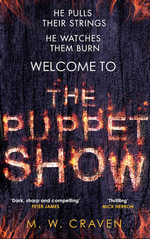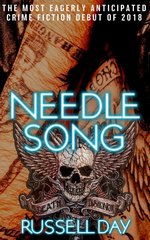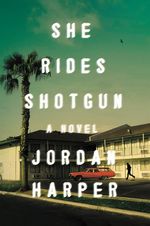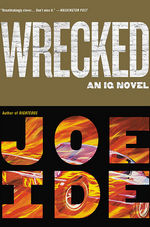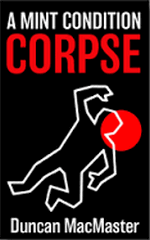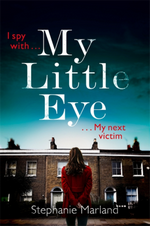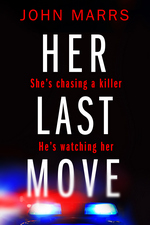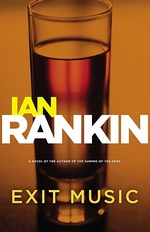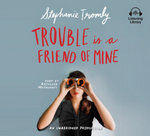|
I’d like to take this opportunity to thank you for all the support you’ve given me and the thoughtful and open minded reviews you’ve written. Without good people like yourself indie presses wouldn’t exist. We can write as much as we want but it’s down to people like you to get the word out.
Finally you the reader. If you’ve got this far you’ve given up your precious time to find out a little bit more about what I think. But it’s just my opinion and you must feel free to take or leave as you wish. In a world of billions to have your time to listen is a very rare privilege. One I don’t take for granted. Many thanks for all your support.
|
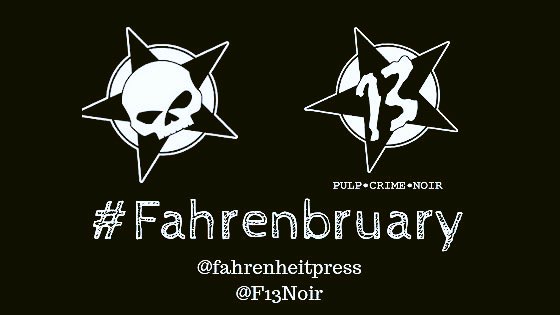
by Ian Patrick
Series: Sam Batford, #2
Kindle Edition, 246 pg.
Fahrenheit Press, 2018
Read: September 14 – 15, 2018

I need to blend in where I shouldn’t belong. The best undercover officers have no air of ego or the appearance of a police mannequin. After all, one sniff of pig and your ass is bacon. I’ve no intention of being served up at any criminal’s barbecue.
How do you follow up 2017’s Rubicon, the twisty, morally ambiguous (at best) tale of an undercover cop? Well, if you’re Ian Patrick, you do it by bringing that shady cop back and putting him in a tighter spot with threats (physical, legal and career) on all sides.
Sam Batford has had a little time off to recuperate and get his head on straight after Rubicon — hopefully giving the heat on him a little time to cool down, and maybe give Big H time to move on from the setback Batford dealt him.
The Met has a new assignment for him — working with the same DCI as he did last time, DCI Klara Winter. During the last assignment, she wasn’t sure she could trust Batford — now she’s convinced that she can’t. In fact, while she wouldn’t mind taking down the criminals that Batford infiltrates, her main objective is to arrest Batford and his Superintendent Mike Hall, a pair she’s convinced are dirty. She’s right, of course, but that’s beside the point.
Ostensibly, Batford’s assignment is to infiltrate a group that’s supposedly planning a major armed robbery and will need a driver of some sorts. But the clock is ticking so he doesn’t have time to do this carefully. Winter has someone already embedded with the crew giving her information, and their primary purpose is to get dirt on Batford and Hall. Which sounds good, but when you get a couple of guys as cagey and wily as this pair, that’s no easy task.
At the same time, Hall’s told Batford that between family and work stresses, this is his last hurrah. Now, he’d like to start his retirement with a sizeable bankroll, and trusts that Batford will find a way to make the both of them some money from just whatever it is that this crew is up to. The crew’s leader, who goes by the cuddly moniker of Razor, is a long-time “unauthorized informant” of Hall’s. And now, he’s sending Batford in to get him arrested. Which seems odd, but it does give Hall enough of an inside track to help Batford.
So, essentially, Batford needs to find a way to get rich off these criminals, hopefully get enough evidence for some arrests, stop them from pulling off whatever they’re trying to — and avoid getting arrested himself (not that he knows he’s being targeted for that). Oh, yeah, and Big H hasn’t moved on, forgotten or forgiven him — in fact, he has an active contract out for Batford’s life, and there are people trying to collect on that. Sounds like a pretty rough time for him.
In Rubicon, there was a question (at least for me) throughout — just how bent is Batford? Will he actually do law enforcement, or is he just out for himself? What are the limits for him? Will he have any success in either his criminal or police activities? In Stoned Love, the questions are different — we know he’s bent pretty far. So it’s just will Batford survive? Will Winter arrest him? Will Hall use him to save his own skin? Will Razor do something to him? Will Big H’s killers eliminate him?
This changed the dynamic of the book for me, and made it a lot easier for me to enjoy this novel and cheer on Batford. There’s no moral or legal gray area any more. Like Michael Corleone or Hannibal Lechter, Sam Batford is a despicable character that the reader wants to find success. Thankfully, he’s nervy enough and clever enough, that there’s a pretty good chance that he will. At least for a while.
Winter is manipulative, deceptive and devoted more to her career than anything else. But she’s, technically, the good guy here. Everyone else is the kind of criminal that the police are supposed to stop, not become. But because we’re in Batford’s head, and Winter’s primarily seen as an obstacle for him to overcome, the reader roots for him and against her — knowing the whole time that it should be the other way around.
There’s frequent and repeated commentary on the effects of Brexit, budget cuts, personnel cuts and other moves by the British government that are impacting the police services throughout the novel. Patrick is a former police officer and if these aren’t his actual views coming forth through Batford, he’s a better author than I think. If Batford’s diagnosis of what’s going on with the police in Britain is accurate, it sounds pretty frightening.
It’s a minor thing — I only noticed this as I started to write this post, and I’ve recently had a bad experience with reading a novel that couldn’t pick a verb tense, so I was primed — but Patrick’s use of the present tense for these books is a subtle, and incredibly effective way of cranking up the tension, propelling the action forward, and pushing the reader to keep up with the pace of the book. I should’ve picked up on it with Rubicon, and am a little annoyed with myself for taking this long to notice.
I enjoyed Rubicon, but I appreciated what Patrick was doing and how he was doing it more. With Stoned Love, I still admired and appreciated his skill and aims, but I enjoyed the story more — I resented things like work and family for preventing me from finishing this as quickly as I wanted to, and absolutely relished an airline flight that meant I had uninterrupted reading time*. I think Stoned Love is an all-around better effort (which is saying something) and makes me very excited to see what comes from Ian Patrick next.
Not everyone enjoys reading books where the police are just as dirty as those they’re supposed to be stopping — and I understand that — but if you’re someone who can embrace a tarnished knight, someone who seems to be law enforcement malgré lui, you don’t want to waste any more time, get your hands on Rubicon and Stoned Love and prepare to be impressed.
—
* I also really appreciated having this to focus on rather than the fact that I was in a giant metal tube that has no business being that far off the ground, but that’s another story.
—–


I bought this shortly after it was released, and then let it collect e-dust on my e-reader, and pretty much used Damp Pebbles’ Book Tour for this as my excuse to read it. I wasn’t over the moon with this one, but I liked it a lot. And then I spent months thinking about it until the sequel came out. Batford’s the kind of character that will not move out of your headspace like any respectable character does when you start a new book. Rather, he’ll take up residence — scratch that, he’ll squat there, not allowing the lease holder to get comfortable sharing the space with him…. I think this metaphor has gotten out of hand, so I’m going to shut up and get on with the post.
—
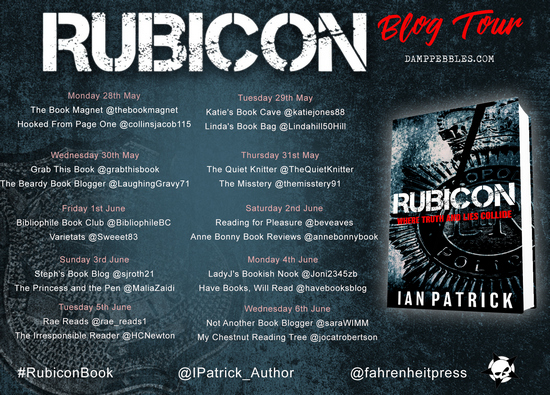
by Ian Patrick
Series: Sam Batford, #1
Kindle Edition, 232 pg.
Fahrenheit Press, 2017
Read: May 31 – June 2, 2018

. . . there’s no money in policing unless you cross the line.
But that doesn’t mean that Sam Batford isn’t going to try.
Batford is an undercover police officer who’s after a kingpin of some repute and his guns and drugs importing. DCI Klara Winter is a no-nonsense head of a task force going after the same kingpin, Big H, more directly — phone taps, applying pressure to associates, interrogations, etc. Batford is assigned to her task force to supplement their intelligence. Neither want this assignment, and work to undermine it immediately. They do actually help each other out — but it’s almost despite their best efforts. Their mutual dislike, distrust and antagonism is one of the more interesting dynamics that I’ve run across lately.
We see most of the novel through Batford’s eyes, with the occasional glimpse from Winter’s perspective. It doesn’t take much to get a strong sense of Winter’s personality and thought process. Just from the volume, the reader ends up seeing things Batford’s way — whether or not they should.
Batford infiltrates Big H’s organization — at least to a degree — for one job. A large one, no doubt, one that would secure Winter’s career (and would do his own some favors). Like most undercover officers (especially in fiction), he cuts many legal and ethical corners to do so. There’s some question — as there should be — whether or not Big H really trusts him, and the constant testing, evaluation and insecurity makes for great reading — it’s an atmosphere you can almost feel through the words.
So Batford is doing what he can to get enough information to take down Big H, to gain his trust (and therefore access), to disrupt the flow of drugs and guns — and mostly to stay alive. If he can find a way to make a little money while he’s at it . . . well, he might as well. Winter just wants enough evidence to make some arrests — and maybe some headlines — so she can get the budget to keep her team working.
This is not a book for the squeamish — there are a few scenes I know that would cause some of my friends and readers to throw the book down in disgust (the same scenes will cause other friends/readers to fist pump their excitement — I’m not sure which of these bothers me more). There’s one scene in particular that made me think of the dental scene from Marathon Man (I’ve never watched the movie just in case they nail that scene from the novel).
There were two . . . I don’t want to say problems for me, but things that kept me from going over the moon with Rubicon: Batford works his way into this assignment by worming his way in to the trust of one Big H’s associates while they’re in Bali. Do Metropolitan Police Undercover Officers really get to globe-trot the way that Batford does? Is that a bit of Artistic License? Is it a sign of just how far outside the lines that Batford colors? Does it tell us that he’s not just a Metropolitan Police Officer? It’s a minor point, I admit — and it’s really easy to accept as kosher (but that doesn’t mean I don’t wonder), because watching Batford’s machinations there is fascinating.
Secondly, Batford displays a very particular vocabulary — I’m not sure if it’s London slang, or Ian Patrick-slang. I could believe either. I will admit that there were periods that the slang got in the way of the story. That’s probably on me — and some of it is Shaw’s two countries separated by a common language phenomenon. With a little bit of work, and a small amount of guesswork (and a willingness to go back and revisit a passage later), it was all accessible enough and perspicuous.
There’s a lot about this book that I’m not sure about — I’ve been chewing on it for a couple of days, and it’s going to take a few more at least. Patrick’s characters take a little chewing, I think. It’d be easy to put Batford in the “murky anti-hero” category and move on — but I’m not sure he fits there; I’m even less sure where Winter fits — she’s not the straight-laced cop you’re at first tempted to label her, nor is she just the figure that makes life difficult for our anti-hero to do what he wants (although she functions pretty well that way). But even if/when I decide how to categorize these two — then I have to decide what I think of them as these characters — are they good people? No. That’s easy. Are they good fictional beings in their particular roles? My gut says yes, and my brain leans that way, but I’m still working on that.
Either way, I’m enjoying chewing on the novel and these ideas — and I’m definitely getting my money’s worth out of this book, just having to think about it this much.
There is part of this evaluation that’s easy — the writing? Gripping. The pacing? Once it gets going, it’s a runaway train that you’re just hoping you can hang on to long enough to get through to the end. The narrative voice is as strong as you could ask, and even when you’re thinking this cop might be more deserving of a being handcuffed on his way to a long incarceration than his targets, you’ll need to hear his singular perspective on the events around him.
Strong writing (some of my favorite sentences of the year are in this book), characters that demand thinking about, a plot that you can’t wrap up in a tidy bow — this isn’t your typical thriller. Whether it’s your cup of tea or not, it’s one that you won’t forget easily.
—–


Once I settled on dividing this chunk of my reading out for its own list, I knew instantly half of the books that’d make it before I looked at just what I’d read in 2018. After going through that list, I had 15 more candidates for the other 5 spots. Whittling those down was hard, but I’m pretty comfortable with this list. That doesn’t mean the other 90 or so books I read in this family of genres were bad — most were great (I can think of maybe 5 I could’ve missed). But these are the crème de la crème.
Man, I wanted to write the crème de la crime there. But I’m better than that.
Not all of these were published in 2018 — but my first exposure to them was. As always, I don’t count re-reads, or almost no one could stand up to Stout, early Parker, etc. and my year-end lists would get old fast.
Now that I’m done with this, I can focus on 2019.
(in alphabetical order by author)
by M. W. Craven
My original post
A book with some of the darkest moments I came across last year — and some of the brightest, too. The mystery was great, the character moments (not just between the protagonists) were better — great rounded, human, characters. Even after I saw where Craven was going with things, I refused to believe it — and only gave up when I had no other choice. Two (at least) fantastic reveals in this book, very compelling writing and fantastic characters. What more do you want? Washington Poe and Tilly Bradshaw are two of my favorite new characters and I can’t wait to see where they go next.


by Russell Day
My original post
I could pretty much copy and paste that above paragraph for this one. It never gets as dark as The Puppet Show, but the depravity displayed is bad enough to unsettle any reader. What makes this story compelling isn’t really the crime, it’s the way the crime impacts the people near it — those who lost a family member (I don’t want to say loved one) and those who are close to the suspects. Yakky and Doc Slidesmith are characters I hope to see again soon, and I want to bask in Day’s prose even more.


by Jordan Harper
My original post
The story of a little girl being surrounded by death and destruction, with both looming and threatening her all the time, and her discovering how to be brave. The story of a man trying to be a good father — or just a father. The story of survival. A story of revenge. A story about all kinds of violence. Wonderfully told.


by Joe Ide
My original post
Not as entertaining as IQ, but it works as a novel in ways the previous two didn’t. I don’t know if I could put my finger on it, but it’s there. Wrecked is a clear step in evolution for Isaiah, Dodson, and probably Ide. It definitely demonstrates that the three are here to stay as long as Ide wants, and that these characters aren’t satisfied with being inner-city Sherlock/Watson, but they’re going places beyond that. Some good laughs, some good scares, some real “I can’t believe Ide ‘let’ them do that to Isaiah” moments — a great read.


by Duncan MacMaster
My original post
I put off reading this for reasons I really don’t understand and haven’t forgiven myself for yet. But the important thing is that I read it — it took me a chapter or two to really get into it, but once I did, I was in hook, like and sinker. In my original post I said this is “a joy to read; full of characters you’ll want to spend days with, that you’ll want to have over for Thanksgiving dinner just to lighten things up and distract you from Aunt Martha’s overcooked yams and dry turkey; a completely fun time that’s very likely most I’ve enjoyed a book in 2018. It is escapist. It is silly. It is clever.” I also said, “Probably the 5-Star-est 5-Stars I’ve given this year.” There are a couple of books that could compete for that line, but I’m not sure they’d win.


by Stephanie Marland
My original post
Fantastic, fantastic premise. Great hook. Another great pair of protagonists (although most of their work is independent of each other). A True Crime blogger and a DI racing to uncover a serial killer, while battling dark secrets, dark pasts, and outside pressures that threaten to derail them at every turn. Marland surprised me more often and in more ways than just about any author this year. I was floored by some of them, too. A great puzzle, a great mish-mash of amateur detective and police procedural.


by John Marrs
My original post
I didn’t realize what I was getting myself into when I said yes to this Book Tour request. I’m not sure I could have — no offense to Mr. Marrs, but I don’t think I’d heard of him before. He’s definitely on my radar now. This was brutal, devastating, shocking, and just about every other adjective reviewers (professional and otherwise) overuse when describing a thriller. Marrs did so many things I didn’t think he would do. He didn’t do a lot that I thought he would (and seemed to mock the idea that he’d so some of what I wanted him to do). I spent a lot of time while reading this book not liking him very much, but so grateful I was getting to read the book. I’m still upset by some of it, but in awe of the experience.


by Ian Patrick
My original post
Sam Batford, undercover cop, is back in a sequel that shows real growth from a very impressive debut. Batford is in incredibly murky ethical and legal waters — and that’s not counting what his undercover op is. Any misstep could ruin his career, end his life, land him in prison — or all three. Actually, those options hold true even if he doesn’t make any missteps. There are so many balls in the air with this one that it’d be easy to lose track of one or more. But Patrick doesn’t seem to struggle with that at all — and he writes in such a way that a reader doesn’t either. That’s a gift not to be overlooked. I liked the overall story more than it’s predecessor and think that Patrick’s writing was better here. This is a series — and a character — that you really need to get to know.
 (I remember liking it more than that…I’m sure I had a reason at the time) (I remember liking it more than that…I’m sure I had a reason at the time)

by Ian Rankin
My original post
I’ve spent enough time with John Rebus over the last couple of years that I knew one of the books had to end p here, I just wasn’t sure which one. Exit Music ended up on the Top 10 not so much for the main mysteries (although they put the book in contention), but for all rest of the things that the novel was about — Rebus’ moving on (not knowing how to or to where), Siobhan moving on (and not sure she wants to), and the dozen or so little things surrounding the two of them and their work. Even Big Ger was kind of moving on here — and that’s just strange to read about. Exit Music would’ve been a great way to say farewell to John Rebus, I’m just glad it wasn’t that.


by Stephanie Tromly, Kathleen McInerney (Narrator)
My original post
If not for Kirby Baxter (above), I could say this was the most fun I had with a Mystery novel this year (not to take anything away from the sequels on that front). This is just the right mix of high school hijinks, teen drama, quirky characters and writing with panache. Zoe and Digby are a great combo of smarts, recklessness and responsibility as they work their way through puzzles surrounding missing kids, drug dealing doctors, and some strange cult-like group. You can feel the chemistry between them — like Remington Steele and Laura Holt, David Addison and Maddy Hays, Cumberbatch’s Sherlock and Freeman’s Watson. Throw in their friends and frenemies and you’ve got a recipe for fun and suspense. I listened to this on audiobook (and bought the paperback for my daughter before I got to the end, I should add) and McInerney’s narration was perfect — she captured the spirit of the book and made the characters come alive.


by Ian Patrick
Series: Sam Batford, #2
Kindle Edition, 246 pg.
Fahrenheit Press, 2018
Read: September 14 – 15, 2018

I need to blend in where I shouldn’t belong. The best undercover officers have no air of ego or the appearance of a police mannequin. After all, one sniff of pig and your ass is bacon. I’ve no intention of being served up at any criminal’s barbecue.
How do you follow up 2017’s Rubicon, the twisty, morally ambiguous (at best) tale of an undercover cop? Well, if you’re Ian Patrick, you do it by bringing that shady cop back and putting him in a tighter spot with threats (physical, legal and career) on all sides.
Sam Batford has had a little time off to recuperate and get his head on straight after Rubicon — hopefully giving the heat on him a little time to cool down, and maybe give Big H time to move on from the setback Batford dealt him.
The Met has a new assignment for him — working with the same DCI as he did last time, DCI Klara Winter. During the last assignment, she wasn’t sure she could trust Batford — now she’s convinced that she can’t. In fact, while she wouldn’t mind taking down the criminals that Batford infiltrates, her main objective is to arrest Batford and his Superintendent Mike Hall, a pair she’s convinced are dirty. She’s right, of course, but that’s beside the point.
Ostensibly, Batford’s assignment is to infiltrate a group that’s supposedly planning a major armed robbery and will need a driver of some sorts. But the clock is ticking so he doesn’t have time to do this carefully. Winter has someone already embedded with the crew giving her information, and their primary purpose is to get dirt on Batford and Hall. Which sounds good, but when you get a couple of guys as cagey and wily as this pair, that’s no easy task.
At the same time, Hall’s told Batford that between family and work stresses, this is his last hurrah. Now, he’d like to start his retirement with a sizeable bankroll, and trusts that Batford will find a way to make the both of them some money from just whatever it is that this crew is up to. The crew’s leader, who goes by the cuddly moniker of Razor, is a long-time “unauthorized informant” of Hall’s. And now, he’s sending Batford in to get him arrested. Which seems odd, but it does give Hall enough of an inside track to help Batford.
So, essentially, Batford needs to find a way to get rich off these criminals, hopefully get enough evidence for some arrests, stop them from pulling off whatever they’re trying to — and avoid getting arrested himself (not that he knows he’s being targeted for that). Oh, yeah, and Big H hasn’t moved on, forgotten or forgiven him — in fact, he has an active contract out for Batford’s life, and there are people trying to collect on that. Sounds like a pretty rough time for him.
In Rubicon, there was a question (at least for me) throughout — just how bent is Batford? Will he actually do law enforcement, or is he just out for himself? What are the limits for him? Will he have any success in either his criminal or police activities? In Stoned Love, the questions are different — we know he’s bent pretty far. So it’s just will Batford survive? Will Winter arrest him? Will Hall use him to save his own skin? Will Razor do something to him? Will Big H’s killers eliminate him?
This changed the dynamic of the book for me, and made it a lot easier for me to enjoy this novel and cheer on Batford. There’s no moral or legal gray area any more. Like Michael Corleone or Hannibal Lechter, Sam Batford is a despicable character that the reader wants to find success. Thankfully, he’s nervy enough and clever enough, that there’s a pretty good chance that he will. At least for a while.
Winter is manipulative, deceptive and devoted more to her career than anything else. But she’s, technically, the good guy here. Everyone else is the kind of criminal that the police are supposed to stop, not become. But because we’re in Batford’s head, and Winter’s primarily seen as an obstacle for him to overcome, the reader roots for him and against her — knowing the whole time that it should be the other way around.
There’s frequent and repeated commentary on the effects of Brexit, budget cuts, personnel cuts and other moves by the British government that are impacting the police services throughout the novel. Patrick is a former police officer and if these aren’t his actual views coming forth through Batford, he’s a better author than I think. If Batford’s diagnosis of what’s going on with the police in Britain is accurate, it sounds pretty frightening.
It’s a minor thing — I only noticed this as I started to write this post, and I’ve recently had a bad experience with reading a novel that couldn’t pick a verb tense, so I was primed — but Patrick’s use of the present tense for these books is a subtle, and incredibly effective way of cranking up the tension, propelling the action forward, and pushing the reader to keep up with the pace of the book. I should’ve picked up on it with Rubicon, and am a little annoyed with myself for taking this long to notice.
I enjoyed Rubicon, but I appreciated what Patrick was doing and how he was doing it more. With Stoned Love, I still admired and appreciated his skill and aims, but I enjoyed the story more — I resented things like work and family for preventing me from finishing this as quickly as I wanted to, and absolutely relished an airline flight that meant I had uninterrupted reading time*. I think Stoned Love is an all-around better effort (which is saying something) and makes me very excited to see what comes from Ian Patrick next.
Not everyone enjoys reading books where the police are just as dirty as those they’re supposed to be stopping — and I understand that — but if you’re someone who can embrace a tarnished knight, someone who seems to be law enforcement malgré lui, you don’t want to waste any more time, get your hands on Rubicon and Stoned Love and prepare to be impressed.
—
* I also really appreciated having this to focus on rather than the fact that I was in a giant metal tube that has no business being that far off the ground, but that’s another story.
—–


by Ian Patrick
Series: Sam Batford, #1
Kindle Edition, 232 pg.
Fahrenheit Press, 2017
Read: May 31 – June 2, 2018

. . . there’s no money in policing unless you cross the line.
But that doesn’t mean that Sam Batford isn’t going to try.
Batford is an undercover police officer who’s after a kingpin of some repute and his guns and drugs importing. DCI Klara Winter is a no-nonsense head of a task force going after the same kingpin, Big H, more directly — phone taps, applying pressure to associates, interrogations, etc. Batford is assigned to her task force to supplement their intelligence. Neither want this assignment, and work to undermine it immediately. They do actually help each other out — but it’s almost despite their best efforts. Their mutual dislike, distrust and antagonism is one of the more interesting dynamics that I’ve run across lately.
We see most of the novel through Batford’s eyes, with the occasional glimpse from Winter’s perspective. It doesn’t take much to get a strong sense of Winter’s personality and thought process. Just from the volume, the reader ends up seeing things Batford’s way — whether or not they should.
Batford infiltrates Big H’s organization — at least to a degree — for one job. A large one, no doubt, one that would secure Winter’s career (and would do his own some favors). Like most undercover officers (especially in fiction), he cuts many legal and ethical corners to do so. There’s some question — as there should be — whether or not Big H really trusts him, and the constant testing, evaluation and insecurity makes for great reading — it’s an atmosphere you can almost feel through the words.
So Batford is doing what he can to get enough information to take down Big H, to gain his trust (and therefore access), to disrupt the flow of drugs and guns — and mostly to stay alive. If he can find a way to make a little money while he’s at it . . . well, he might as well. Winter just wants enough evidence to make some arrests — and maybe some headlines — so she can get the budget to keep her team working.
This is not a book for the squeamish — there are a few scenes I know that would cause some of my friends and readers to throw the book down in disgust (the same scenes will cause other friends/readers to fist pump their excitement — I’m not sure which of these bothers me more). There’s one scene in particular that made me think of the dental scene from Marathon Man (I’ve never watched the movie just in case they nail that scene from the novel).
There were two . . . I don’t want to say problems for me, but things that kept me from going over the moon with Rubicon: Batford works his way into this assignment by worming his way in to the trust of one Big H’s associates while they’re in Bali. Do Metropolitan Police Undercover Officers really get to globe-trot the way that Batford does? Is that a bit of Artistic License? Is it a sign of just how far outside the lines that Batford colors? Does it tell us that he’s not just a Metropolitan Police Officer? It’s a minor point, I admit — and it’s really easy to accept as kosher (but that doesn’t mean I don’t wonder), because watching Batford’s machinations there is fascinating.
Secondly, Batford displays a very particular vocabulary — I’m not sure if it’s London slang, or Ian Patrick-slang. I could believe either. I will admit that there were periods that the slang got in the way of the story. That’s probably on me — and some of it is Shaw’s two countries separated by a common language phenomenon. With a little bit of work, and a small amount of guesswork (and a willingness to go back and revisit a passage later), it was all accessible enough and perspicuous.
There’s a lot about this book that I’m not sure about — I’ve been chewing on it for a couple of days, and it’s going to take a few more at least. Patrick’s characters take a little chewing, I think. It’d be easy to put Batford in the “murky anti-hero” category and move on — but I’m not sure he fits there; I’m even less sure where Winter fits — she’s not the straight-laced cop you’re at first tempted to label her, nor is she just the figure that makes life difficult for our anti-hero to do what he wants (although she functions pretty well that way). But even if/when I decide how to categorize these two — then I have to decide what I think of them as these characters — are they good people? No. That’s easy. Are they good fictional beings in their particular roles? My gut says yes, and my brain leans that way, but I’m still working on that.
Either way, I’m enjoying chewing on the novel and these ideas — and I’m definitely getting my money’s worth out of this book, just having to think about it this much.
There is part of this evaluation that’s easy — the writing? Gripping. The pacing? Once it gets going, it’s a runaway train that you’re just hoping you can hang on to long enough to get through to the end. The narrative voice is as strong as you could ask, and even when you’re thinking this cop might be more deserving of a being handcuffed on his way to a long incarceration than his targets, you’ll need to hear his singular perspective on the events around him.
Strong writing (some of my favorite sentences of the year are in this book), characters that demand thinking about, a plot that you can’t wrap up in a tidy bow — this isn’t your typical thriller. Whether it’s your cup of tea or not, it’s one that you won’t forget easily.
—–

|
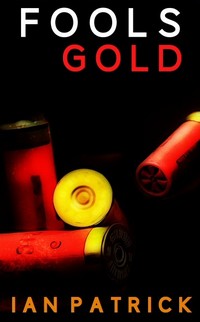


![]()



 Grab a book, any book.
Grab a book, any book.




